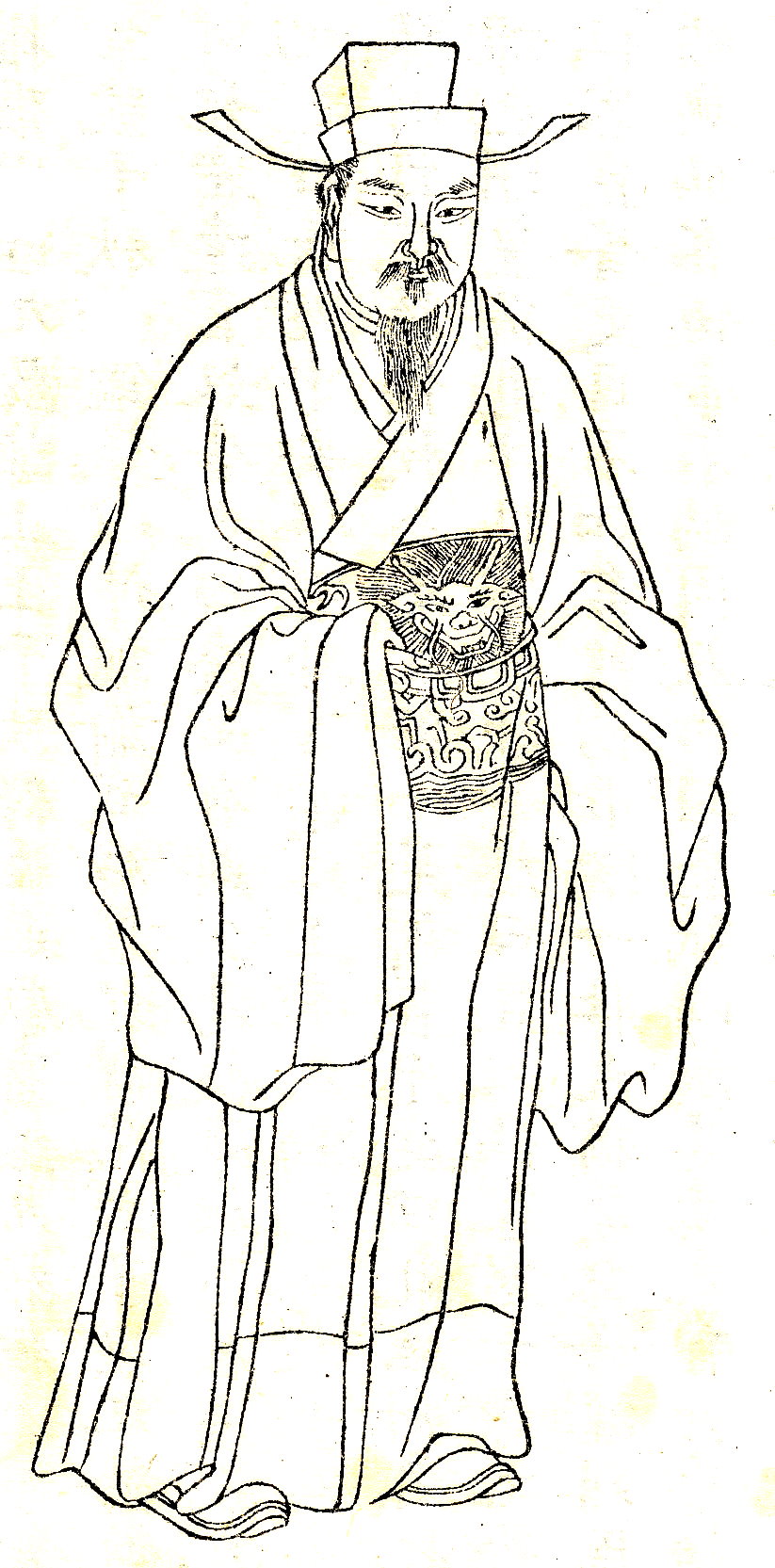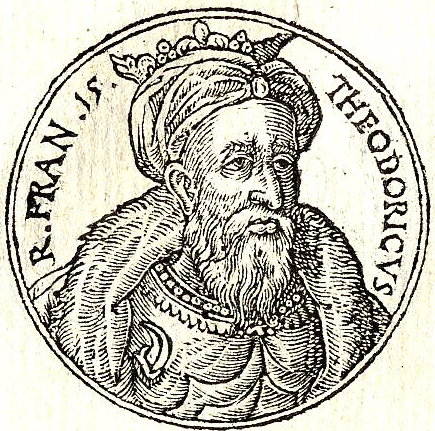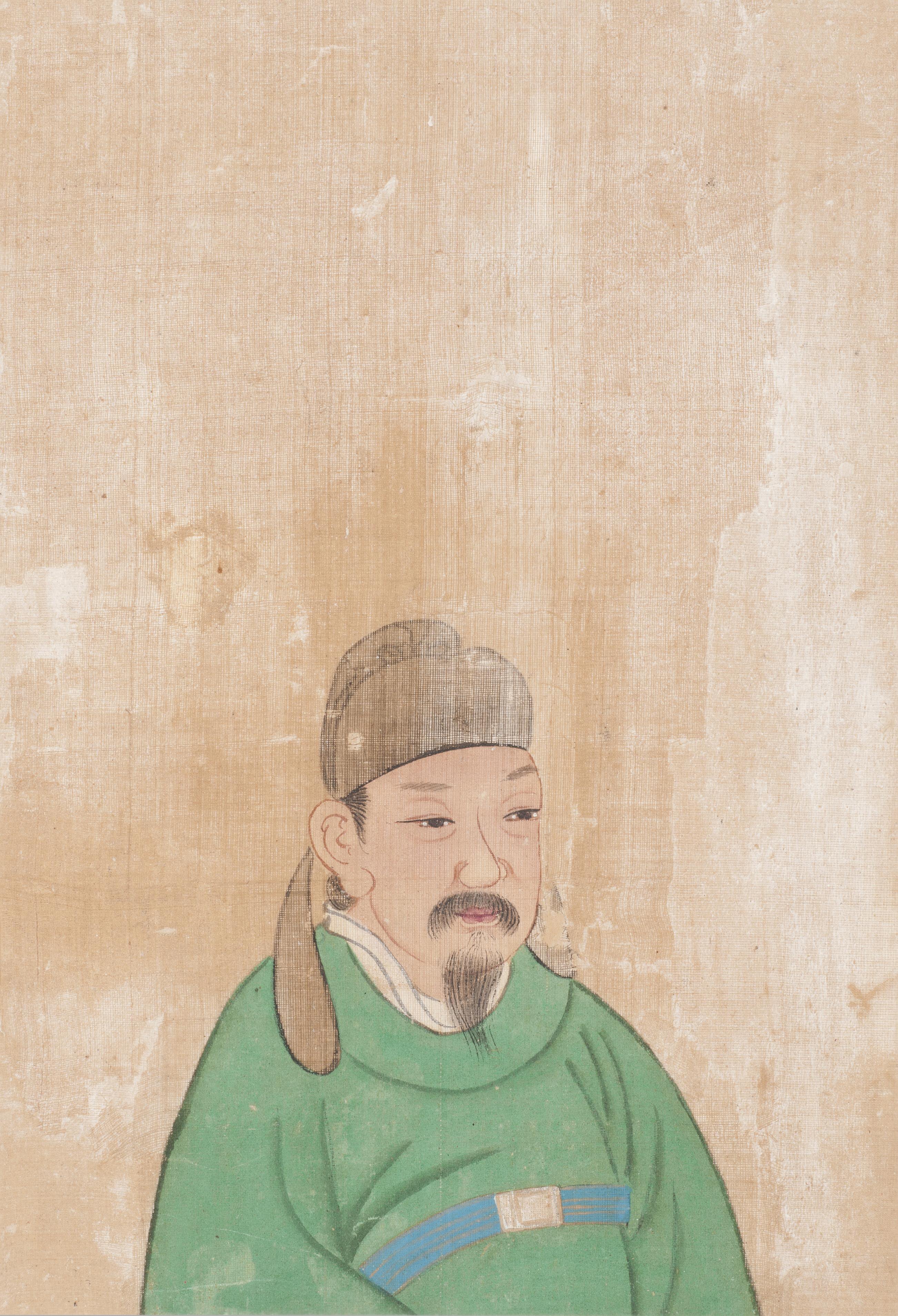|
Niu Xianke
Niu Xianke () (675 – September 2, 742), formally Duke Zhenjian of Bin (), was a general and official of the Chinese Tang dynasty. He served as a chancellor during the reign of Emperor Xuanzong of Tang. He took an unconventional path to the position of chancellor by starting as a low-level bureaucrat and gradually getting promoted, rather than going through the imperial examinations, and was known for being careful and obedient to fellow chancellor Li Linfu. Background Niu Xianke was born in 675. He was from Jing Prefecture (涇州, roughly modern Pingliang, Gansu). His family traced its ancestry to the Han dynasty military official Niu Han (), whose descendants later settled in the region that became Jing Prefecture. His family was not prominent in political circles, as, unlike most other chancellors of the time, there were no records of any other ancestors of his serving as officials. All that were recorded about his great-grandfather Niu Tong (), grandfather Niu Hui (), and ... [...More Info...] [...Related Items...] OR: [Wikipedia] [Google] [Baidu] |
Tang Dynasty
The Tang dynasty (, ; zh, c=唐朝), or the Tang Empire, was an Dynasties of China, imperial dynasty of China that ruled from 618 to 907, with an Wu Zhou, interregnum between 690 and 705. It was preceded by the Sui dynasty and followed by the Five Dynasties and Ten Kingdoms period. Historians generally regard the Tang as a high point in Chinese civilisation, and a Golden age (metaphor), golden age of cosmopolitan culture. Tang territory, acquired through the military campaigns of its early rulers, rivalled that of the Han dynasty. The House of Li, Li family founded the dynasty after taking advantage of a period of Sui decline and precipitating their final collapse, in turn inaugurating a period of progress and stability in the first half of the dynasty's rule. The dynasty was formally interrupted during 690–705 when Empress Wu Zetian seized the throne, proclaiming the Wu Zhou dynasty and becoming the only legitimate Chinese empress regnant. The An Lushan rebellion (755 ... [...More Info...] [...Related Items...] OR: [Wikipedia] [Google] [Baidu] |
Zhang Jiuling
Zhang Jiuling () (678 or 673 – 5 June 740), courtesy name Zishou (), nickname Bowu (), formally Count Wenxian of Shixing (), was a Chinese poet and politician of the Tang dynasty, serving as chancellor during the reign of Emperor Xuanzong. Early life Zhang Jiuling was born in 678, during the reign of Emperor Gaozong. His family was from Qujiang () in Shao Prefecture (, roughly modern Shaoguan, Guangdong) in the region called Lingnan ), which was at the time a relatively remote area of the Tang empire. His family traced its ancestry to the Jin dynasty (266–420) chancellor Zhang Hua, and his eldest son Zhang Yi (). His great-grandfather Zhang Junzheng () served as the secretary general of Shao Prefecture, and therefore settled there. His grandfather Zhang Zizhou () served as a county magistrate, and his father Zhang Hongyu () served as a county secretary general. Zhang Jiuling was said to be intelligent in his childhood and capable in literary skills. In 685, when he ... [...More Info...] [...Related Items...] OR: [Wikipedia] [Google] [Baidu] |
742 Deaths
__NOTOC__ Year 742 ( DCCXLII) was a common year starting on Monday of the Julian calendar, the 742nd year of the Common Era (CE) and Anno Domini (AD) designations, the 742nd year of the 1st millennium, the 42nd year of the 8th century, and the 3rd year of the 740s decade. The denomination 742 for this year has been used since the early medieval period, when the Anno Domini calendar era became the prevalent method in Europe for naming years. Events By place Europe * King Liutprand of the Lombards meets Pope Zachary at Terni (Central Italy), who appeals to the king's religious faith. Liutprand is a pious Catholic and signs a 20-year peace treaty, restoring the cities of the Duchy of Rome which he has captured. The independent Lombard duchies of Spoleto and Benevento absorb into the Lombard Kingdom. * Arab-Byzantine Wars: Arab forces under Sulayman ibn Hisham invade Anatolia, reaching as far as Herakleia, and return with much wealth and livestock. * Umayyad conquest of ... [...More Info...] [...Related Items...] OR: [Wikipedia] [Google] [Baidu] |
675 Births
__NOTOC__ Year 675 ( DCLXXV) was a common year starting on Monday of the Julian calendar. The denomination 675 for this year has been used since the early medieval period, when the Anno Domini calendar era became the prevalent method in Europe for naming years. Events By place Europe * King Childeric II is murdered by a band of dissatisfied Neustrians, along with his wife Bilichild and 5-year-old son Dagobert, while hunting in the forest of Livry (modern-day Lognes) near Chelles. * Theuderic III retakes the throne of his elder brother Childeric II. He inherits the Frankish kingdoms of Neustria and Burgundy. * Clovis III, an illegitimate son of Chlothar III, is proclaimed king of Austrasia by the Austrasian nobles. Britain * King Wulfhere of Mercia dies after a 17-year reign, in which he has extended his sway over much of England south of the Humber River, including Essex, Surrey, and part of Wessex north of the Thames. Wulfhere is succeeded by his brother Æthelr ... [...More Info...] [...Related Items...] OR: [Wikipedia] [Google] [Baidu] |
Yao Chong
Yao Chong (; 650 – September 28, 721), born Yao Yuanchong (姚元崇), known 700s–713 by the courtesy name Yuanzhi (), formally Duke Wenxian of Liang (), was an official of the Chinese Tang dynasty and Wu Zetian's Wu Zhou dynasty, serving as chancellor under four sovereigns—Wu Zetian, her sons Emperor Zhongzong and Emperor Ruizong, and her grandson Emperor Xuanzong. After his resignation in 716, he still had great influence inside the imperial government, and his opinions often influenced the decisions of Emperor Xuanzong and the succeeding chancellors. Family *Consorts and issues: **Lady Wang, of the Wang clan (女王氏) **Furen, of the Zheng clan (夫人鄭氏) **Furen, of the Liu clan (夫人劉氏) ***Yao Yi (姚彝; 677- 16 September 716), first son ***Yao Yi (姚异), second son **Unknown: ***Yao Yi (姚弈), third son ***Lady Yao (姚氏), of the Yao clan Background Yao Chong was born in 650, during the reign of Emperor Gaozong. His father Yao Shanyi (� ... [...More Info...] [...Related Items...] OR: [Wikipedia] [Google] [Baidu] |
Chang'an
Chang'an (; zh, t=長安, s=长安, p=Cháng'ān, first=t) is the traditional name of the city now named Xi'an and was the capital of several Chinese dynasties, ranging from 202 BCE to 907 CE. The site has been inhabited since Neolithic times, during which the Yangshao culture was established in Banpo, in what is now the city's suburbs. Furthermore, in the northern vicinity of modern Xi'an, Qin Shi Huang of the Qin dynasty, China's first emperor, held his imperial court and constructed his massive mausoleum guarded by the Terracotta Army. From its capital at Xianyang, the Qin dynasty ruled a larger area than either of the preceding dynasties. The imperial city of Chang'an during the Han dynasty was located northwest of today's Xi'an. During the Tang dynasty, the area that came to be known as Chang'an included the area inside the Ming Xi'an fortification, plus some small areas to its east and west, and a substantial part of its southern suburbs. Thus, Tang Chang'an was eight t ... [...More Info...] [...Related Items...] OR: [Wikipedia] [Google] [Baidu] |
Shanxi
Shanxi; Chinese postal romanization, formerly romanised as Shansi is a Provinces of China, province in North China. Its capital and largest city of the province is Taiyuan, while its next most populated prefecture-level cities are Changzhi and Datong. Its one-character abbreviation is (), after the Jin (Chinese state), state of Jin that existed there during the Spring and Autumn period (). The name ''Shanxi'' means 'west of the mountains', a reference to its location west of the Taihang Mountains. Shanxi borders Hebei to the east, Henan to the south, Shaanxi to the west and Inner Mongolia to the north. Shanxi's terrain is characterised by a plateau bounded partly by mountain ranges. Shanxi's culture is largely dominated by the ethnic Han Chinese, Han majority, who make up over 99% of its population. Jin Chinese is considered by some linguists to be a distinct language from Mandarin and its geographical range covers most of Shanxi. Both Jin and Mandarin are spoken in Shanxi. ... [...More Info...] [...Related Items...] OR: [Wikipedia] [Google] [Baidu] |
Taiyuan
Taiyuan; Mandarin pronunciation: (Jin Chinese, Taiyuan Jin: /tʰai˦˥ ye˩˩/) is the capital of Shanxi, China. Taiyuan is the political, economic, cultural and international exchange center of Shanxi Province. It is an industrial base focusing on energy and heavy chemicals. Throughout its long history, Taiyuan was the capital or provisional capital of many dynasties in China, hence the name ( zh, s=龙城, p=Dragon City, labels=no). As of 2021, the city governs 6 districts, 3 counties, and hosts a county-level city with a total area of 6,988 square kilometers and a permanent population of 5,390,957. Taiyuan is located roughly in the centre of Shanxi, with the Fen River flowing through the central city. Etymology and names The two Chinese characters of the city's name are (, "great") and (, "plain"), referring to the location where the Fen River leaves the mountains and enters a relatively flat plain. Throughout its long history, the city had various names, including ... [...More Info...] [...Related Items...] OR: [Wikipedia] [Google] [Baidu] |
Li Shizhi
Li Shizhi (; 694 - 747), né Li Chang (李昌), formally the Duke of Qinghe (清和公), was a Chinese poet and politician during the Tang dynasty, serving as a chancellor during the reign of Emperor Xuanzong. He was known as one of the Eight Immortals of the Wine Cup due to his ability to drink a large amount of wine without becoming drunk. Background Li Shizhi was born in 694, late in his father Li Xiang's life. His grandfather was Li Chengqian, the eldest son and original crown prince of Tang dynasty's second emperor Emperor Taizong. Li Chengqian was deposed in 643 but spared, and his line was bypassed in the subsequent succession, which eventually went to his brother Li Zhi (Emperor Gaozong). Li Shizhi's father Li Xiang () served as a prefectural secretary general during the reign of Emperor Gaozong's wife Wu Zetian, but was removed by her. Li Shizhi himself started his public service as an officer of the imperial guards during the second reign of Emperor Gaozong's son ( ... [...More Info...] [...Related Items...] OR: [Wikipedia] [Google] [Baidu] |







